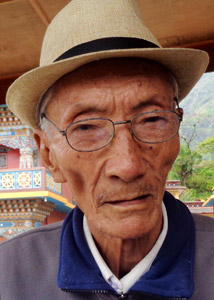Name: Dawa Dhondup
(Alias: No)
Gender: Male
Interview Age: 80
Date of Birth: 1935
Birthplace: Kepyang, Utsang, Tibet
Year Left Tibet: 1959
Profession: Nomad
Monk/Nun: No
Political Prisoner: No

Interview No.: 48N
Date: 2015-04-16
Language: Tibetan
Location: Tashi Palkhiel, Pokhara, Gandaki, Nepal
Categories: Culture and History
Keywords: childhood memories, Chinese -- oppression under, customs/traditions, escape experiences, nomadic life, Utsang, wealthy/upper class
Summary:
Dawa Dhondup grew up in Jang Tsakha, the place where one gathered salt. His was a large family of nine siblings. Dawa Dhondup shares the joys and difficulties in the life of a nomad. He speaks about the harsh winter months and how animals and humans managed to survive in the extreme cold and snow. Food for the animals was scarce and water for human consumption had to be melted from ice blocks. Heavy animal skins were worn for warmth and cloth or glasses worn over the eyes to protect from snow blindness. Summer and autumn were the best time of the year.
Dawa Dhondup explains that wealth was determined by the number of animals a family owned, making his own family wealthy since they owned around 200 yaks, dri 'female yaks,' a thousand sheep and goats, and 15-16 horses. He describes the different ways the animals used such as transporting salt and milking. The family had 5-6 servants who helped with the animals and preparing grains for consumption.
After the Chinese occupation, Dawa Dhondup's father was arrested for being a community leader and underwent "reeducation" before being released. The family escaped to Mustang, Nepal and most of their animals died from starvation. The remaining animals were sold for a low price and work was difficult to find in Nepal.
Interview Team:
- Katharine Davies Samway (Interviewer)
- Henry Tenenbaum (Videographer)
- Palden Tsering (Interpreter)

